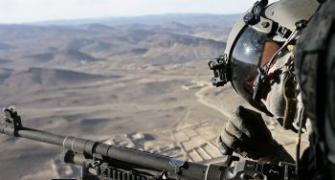India, Pakistan and Afghanistan must cooperate with each other to reduce violence in the region, a powerful US Senator and President Barack Obama's key foreign policy aid said on Wednesday.
"New York or Mumbai or Peshawar", all are threatened by extremism, said John Kerry, chairman of the powerful senate foreign relations committee, in his opening remarks on a hearing on Afghanistan.
Kerry said confronting terrorism was a major challenge before the world and cooperation was the key to succeed against the menace.
"We must work together in stopping people throwing bombs and killing innocent people. That's the world's challenge, and it means Afghanistan, Pakistan and India must cooperate to reduce the violence and eliminate the tensions," Kerry said.
He added that Pakistan was the core of US challenge in the region, as all major terror groups including the Lashkar-e-Tayiba, and Al Qaeda leaders, "most likely including Osama bin Laden", are based in Pakistan.
Key Republican Senator Richard Lugar, meanwhile, said the future of governance in Pakistan has consequences on global economic stability, non-proliferation efforts and US' relationship with India and China, besides on security in both the Middle East and South Asia regions, among other major issues.
"The potential global impact of instability in a nuclear armed Pakistan dwarfs anything that is likely to happen in Afghanistan," Lugar, ranking member of the committee said. "The future direction of governance in Pakistan will have consequences for non-proliferation efforts, global economic stability, our relationships with India and China and security in both the Middle East and South Asia regions, among other major issues," Lugar said.
Highlighting the need for taking the war on terror to its logical end in Pakistan, Kerry said from Haqqani network to Quetta Shura, the extremist groups do not stop at Afghan border and "so our strategy must also extend to Pakistan".
"Al Qaeda's leaders are there, most likely including Osama bin Laden, homegrown militants like the LeT are there, and so are the men directing Taliban insurgency in Afghanistan," he said.
"Pakistan is a sovereign nation, and we need to convince its government to tackle all of extremist groups threatening regional and international security for Pakistan's sake, as well as ours," Kerry argued.
Taking on the terror networks in Pakistan will be crucial to success in Afghanistan, he said, adding that the US is prepared to provide Pakistan equipment and military assistance to help it prevail against extremists, but "we have to know that we are building a new and lasting partnership".
"Our challenge today is to persuade Pakistan that it cannot and doesn't need to hedge its bets."
Kerry said the US was committed to the people of the region, pointing out that in 2009 alone the US has given about USD 300 million for Pakistan's conflict-affected.
Pointing out that the Afghan battlefield was "astride a border with Pakistan that is a porous line for the militants," Lugar said the US troops there are handicapped by the fact. "As long as this border provides enemy with an avenue of retreat for re-supply and sanctuary, our prospects for destroying or incapacitating the insurgency are negligible," he said, adding, "It was a strategic obstacle for forces".
Lugar, who co-authored the bill for $7.5 billion aid to Pakistan over five years, said while US spent billions fighting in strategically less important Afghanistan,
"The Taliban and the Al Qaeda leaders become increasingly secure in Pakistan". If they are able to sit safely across border directing a hit and run war against us in Afghanistan, plotting catastrophic terrorist attacks abroad, and working to destabilise Pakistan from within, our strategic goals in the region will be threatened despite progress on the ground in Afghanistan," Lugar said.
He also pointed out reports indicating that some of the Taliban leaders were moving out of remote areas into crowded cities, including Karachi, to escape the US drone strikes.
"If such reports are true, the US will have even fewer options in pursuing Taliban and Al Qaeda leaders in Pakistan, absent the active help of Pakistani authorities," he said.
"... Will Pakistan work with us to eliminate the leadership of Osama bin Laden and other major Al Qaeda officials?" he asked.
He said it was still uncertain whether the training mission would succeed sufficiently to allow US forces to disengage from combat duties in a reasonable time period.






